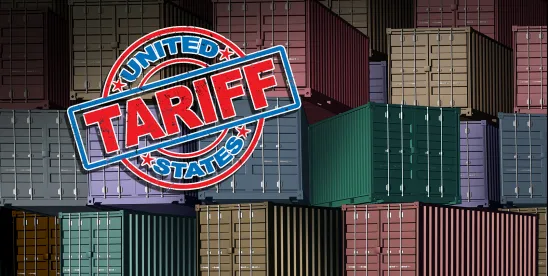President Trump has used tariffs as a significant point of geopolitical leverage since the beginning of his second term. Indeed, his administration dubbed April 2, 2025 “Liberation Day” in honor of a sweeping set of tariffs imposed on a variety of goods and counterparties. These included, among others, a 10 percent universal tariff on all imports into the United States effective April 5, 2025.[1] Certain countries and territories have heightened tariffs imposed, such as Japan at 24 percent and the EU at 20 percent, based on the administration’s assessment that these countries are “bad actors on trade.”[2] China, by far, had the largest tariff imposed with 54 percent to account for all imports and fentanyl.[3]
One notable subset of the administration’s approach is the novel concept of “secondary tariffs,” which are tariffs imposed because a trade partner engages with a third country with which the administration is at odds. On March 24, 2025, President Trump amended and reissued Executive Order 13692 (now Executive Order 14245) authorizing this new approach.[4] EO 14245 instructs Secretary of State Marco Rubio, in coordination with the secretaries of the Treasury, Commerce, and Homeland Security, along with the United States Trade Representative, to impose a 25 percent tariff on all goods imported into the United States from any country that directly or indirectly imports Venezuelan oil.[5] EO 14245 was amended on the basis that the “actions and policies of the regime of Nicolas Maduro in Venezuela continue to pose an unusual and extraordinary threat to the national security and foreign policy of the United States.”[6]
Notably, EO 14245 uses discretionary language to determine whether the 25 percent tariff should be applied. Section 2 states that “a tariff of 25 percent may be imposed on all goods imported into the United States from any county that imports Venezuelan oil, whether directly from Venezuela or indirectly through third parties.”[7] Secretary of Commerce Howard Lutnick is responsible in the first instance for determining whether a country has directly or indirectly imported Venezuelan oil, as defined by EO 14245, and issue additional regulations, guidance, and determinations as necessary to implement the Order.[8] It is then up to Secretary of State Rubio to determine that a tariff should be imposed on all goods from any such country, and the initial list of impacted countries was slated to be announced April 2, 2025, though it has not yet been released.[9]
The Order follows the Trump administration’s previous actions to wind down US producers’ operations in Venezuela. The Treasury Department ordered a US-based oil and gas company to wrap up Venezuelan operations ahead of the termination of its General License to operate and export crude oil to the United States. Multiple other oil and gas companies that have licenses to operate in Venezuela have received notices that such operational licenses will be revoked, and OFAC is therefore likely to issue additional licenses permitting for wind-down operations only.
The Trump administration’s imposition of discretionary “secondary sanctions” indicates a less lenient stance on Venezuelan oil exports than that of the Biden administration. The U.S. Treasury Department’s Office of Foreign Asset Control (OFAC) issued four general licenses suspending select sanctions in October 2023, which authorized certain transactions involving Venezuela’s oil and gas sector and gold sector and removed secondary trading bans.[10] The Biden administration did so in exchange for promises from the Maduro regime to address human rights abuses and hold free and fair elections.
However, in April 2024, OFAC replaced and superseded General License 44 (“GL44”), which had suspended certain sanctions measures on Venezuelan oil and gas operations, with GL44A on the basis that Maduro and his representatives did not fully meet their commitments as promised.[11] GL44A permits only certain “wind down authorizations” for operations previously authorized by GL44 and is explicit that entering into new business and investments would not be considered “wind-down activity.”[12] On February 26, 2025, President Trump additionally determined that Maduro had not honored certain promises and had failed to expedite migrant returns as President Trump had insisted. As a result, OFAC terminated the aforementioned US-based oil and gas company’s General License and issued a subsequent General Licensing allowing for the wind-down activity of its operations only. As discussed, OFAC will likely follow suit for those companies who have received notices.
Paradoxically, despite taking steps to isolate the Venezuelan oil market the United States imported roughly 222,000 barrels per day from Venezuela in 2024.[13] The U.S. Energy Information Administration additionally reported that as of January 2025, the United States imported 287,000 barrels of crude oil from Venezuela per day.[14] This number is certain to decrease based on expiring licenses and new tariff policies, but exemplifies the difficulty of implementing EO 14245 and presents the question of whether the United States will stop importing Venezuelan oil due to the Order’s stated “national security” concerns or instead continue activity for which it would subject other countries to tariffs. Other countries that rely on Venezuelan oil imports include China, India, Spain, Cuba, Brazil, Turkey, Italy, Russia, Singapore and Vietnam.[15]
Countries who regularly directly or indirectly import Venezuelan oil now face a high-stakes choice if they desire to also continue importing any and “all goods” into the United States. While it is not certain that tariffs would attach given the discretionary application, President Trump has shown great appetite in his first 100 days for making geopolitical statements through tariffs. And once on that ever-evolving list, it is unclear how long a country would stay on it, as the Order provides that the tariff will expire at either “1 year after the last date on which the country imported Venezuelan oil” or at an earlier, discretionary date.[16] Companies who have received US licenses for Venezuelan oil should remain vigilant in the ever-changing landscape to avoid negative and unforeseen implications should such licenses be abruptly revoked. It is also unclear at this time whether the Trump administration will impose its baseline tariffs and additional discretionary tariffs under EO 14545, resulting in double exposure for companies.
In short, EO 14245 combined with the above measures against various companies, demonstrate how the Trump administration is increasing efforts to further disrupt the flow of Venezuela’s oil exports. For more information, reach out to Bracewell’s government enforcement and investigations team in Houston, New York and London for guidance.
[1] Trump Unveils Sweeping Tariffs in Stark Shift in Trade Policy, Wall Street Journal (April 2, 2025), https://www.wsj.com/livecoverage/trump-tariffs-trade-war-stock-market-04-02-2025.
[2] Id.
[3] Id.
[4] Executive Order 13692 was originally issued on March 8, 2015 (Blocking Property and Suspending Entry of Certain Persons Contributing to the Situation in Venezuela) and continued recently on February 27, 2025 (Continuation of the National Emergency with Respect to Venezuela). It is now listed as Executive Order 14245 within the Federal Register. See Federal Register: Imposing Tariffs on Countries Importing Venezuelan Oil. This alert was published with references to the original Executive Order 13692 and has since been updated to include references to Executive Order 14245.
[5] Imposing Tariffs on Countries Importing Venezuelan Oil – The White House
[6] Id.
[7] Id. (emphases added).
[8] Id.
[9] Id.
[10] In Response to Electoral Roadmap, Treasury Issues New Venezuela General Licenses, U.S. Dept. of the Treasury (Oct. 13, 2023), https://home.treasury.gov/news/press-releases/jy1822
[11] https://ofac.treasury.gov/media/932821/download?inline
[12] Id.
[13] New Tariffs on Countries Importing Venezuelan Oil, Deringer (March 25, 2025), https://www.anderinger.com/tariffs-importing-venezuelan-oil/.
[14] Petroleum & Other Liquids, Company Level Imports (March 31, 2025), https://www.eia.gov/petroleum/imports/companylevel/.
[15] New Tariffs on Countries Importing Venezuelan Oil, Deringer (March 25, 2025), https://www.anderinger.com/tariffs-importing-venezuelan-oil/.
[16] Imposing Tariffs on Countries Importing Venezuelan Oil – The White House





 />i
/>i

